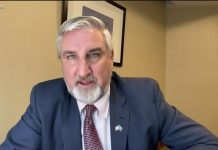A Greenwood mental health and drug treatment facility is becoming one of four new treatment centers partnering with the state to focus on helping people beat opioid addictions.
In addition to Valle Vista in Greenwood, the other centers are: the Bowen Center in Allen County, the Hamilton Center in Vigo County and Sycamore Springs, which will have facilities in Monroe and Tippecanoe counties. These facilities are anticipated to begin offering services by June 30, 2018.
“Adding five opioid treatment programs to the 14 that currently serve Hoosiers will add considerable capacity to a network of programs that treated more than 10,000 Hoosiers in 2016,” said dR. Jennifer Walthall, Indiana Family and Social Services Administration secretary. “Adding Medicaid and HIP coverage of medication assisted treatment will remove a significant barrier to treatment for those seeking to improve their lives.”
Valle Vista Health System will offer additional treatment and services, including methadone, which is a medication used to block the effects of opioids. Other additional treatment centers will be located around the state in or near counties with high naloxone use, state officials said. Naloxone, also known as Narcan, is a drug used to treat narcotic overdoses.
Gov. Eric Holcomb came to Valle Vista Health System in Greenwood on Wednesday to announce the state’s plan to expand the opioid treatment program, including the plans for Valle Vista.
Walthall described the program between Valle Vista and other treatment facilities and the state as a partnership.
Valle Vista is one of few facilities in the state that treat opioid addiction, which includes heroin and pain medication. In recent years, with growth of the state’s Medicaid program, more people have coverage for that type of care, meaning an even greater demand on the Greenwood facility.
The treatment center at 898 E. Main St., also helps adults, children and teens with mental health issues.
Holcomb said shortly after taking office that curbing the crisis of drug addiction in Indiana was one of his top priorities and called on residents to help him attack it “with everything that we have.”
The partnership between treatment centers and the state is part of a new state law, Senate Bill 464,which called for the state to approve no more than five new opioid treatment programs run by a hospital or mental health center. Fourteen treatment centers are already open across the state.
The law also outlines that addiction counseling, inpatient detoxification, case management, teaching of daily living skills and use of nonaddictive long-acting medication may be needed to treat opioid or alcohol addiction and can be required as a condition of parole, probation, community corrections, completion of pretrial diversion or other alternative court programs.
The new law also requires the Healthy Indiana Plan to cover nonaddictive medication assistance treatment drugs prescribed for the treatment of substance abuse.
The state’s division of mental health and addiction can also use money to fund grants and vouchers for mental health and addiction forensic treatment services through community corrections programs, court programs, probation and diversion, community mental health centers or certified mental health or addiction providers.
Residents would be eligible for the treatment if they meet certain criteria and can not get the treatment covered by insurance, Medicare or Medicaid, the law said. State agencies would also work together to find training and employment for residents receiving addiction treatment, the law said.
“If I could accomplish one thing in life, just granted one wish, it would be to change the trajectory that we’re on right now and bend it down,” Holcomb said in January of the opioid addiction crisis.
Addiction is not only a human crisis in Indiana, but has become a crisis for businesses as well, as employers can’t find a workforce that is sober and focused on the work and the dignity that comes from a job well done. He has said that Indiana and the Midwest are Ground Zero when it comes to addiction, and its toll is apparent: addiction is keeping Indiana and its people from reaching their full potential.
He said at the time that he wants communities to help find and fund pathways to recovery, will consider any and every piece of legislation that could make a difference and created a new position in state government, an executive director for drug prevention, treatment and enforcement.
The state is also building a new hospital to treat mental illness and addiction, but it can only house 159 patients and is just one step, Holcomb has said.




